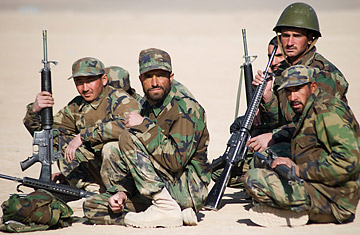
Afghan army recruits attend basic training at the Kabul Military Training Center on Jan. 11, 2011
Afghan members of parliament voiced concerns on March 13, during a session of the upper house, that national security forces are not well enough trained or equipped to take over from NATO units. The statements came the day before General David Petraeus, commander of U.S. and NATO forces in Afghanistan, met with President Barack Obama to speak about the coming transition. On March 21, Afghan President Hamid Karzai is expected to announce the regions that will see the first handovers.
"The time is not right for a transition to Afghan security forces. They are not ready. They are not well trained, and they are not commanded and organized well," Golalai Akbari, a member of the upper house from Badakhshan tells TIME from her home in the northeastern province — one likely to see a transition soon. "During the summer, the mountain passes and roads between Afghanistan and Pakistan will be open in our province. The Taliban will be able to come over from neighboring countries and harass the people. The Afghan army still needs the help of its allies," says Akbari.
On March 21, the Afghan New Year, Karzai is scheduled to announce the areas where Afghans will begin to assume security responsibilities starting mid-July. In a speech last week in Kabul, Karzai said 2011 would be a "critical" year, one with its share of "crises and difficulties." He added that "five to six places" would be handed over to the Afghan National Army, the Afghan National Police, local police and other units of the security services. It is expected that those places will be Bamiyan, Panjshir and much of Kabul province, and the cities of Herat, Lashkar Gah and Mazar-i-Sharif. The areas have been relatively stable, compared with the rest of the country, and have low levels of U.S. troops.
Afghans in the regions that will be affected by the first wave of handovers are ambivalent or negative about the coming change. "Here, people have different opinions. Some people are happy for the security transition, and some people worry about this issue," says a resident of Bamiyan who works for an international development organization, speaking on condition of anonymity for fears over his family's safety. "Some of them think there will be problems here between the Afghan military and the Taliban. They think the peace will be broken and there will be new fighting. They are also afraid that some rehabilitation and development projects will slow down or stop. They trust in the transition mostly, but they have some concerns."
The statements in the upper house, and a corresponding vote to request that Afghan security officials explain the transition process during the next general session, were well timed, delivered on the eve of Petraeus' meeting with Obama and Defense Secretary Robert Gates, in which they discussed "the plan to begin the reduction of U.S. forces ... the path to completing the transition to full Afghan responsibility for security by the end of 2014," the White House said in a statement. "The Afghan issue has both national and international aspects, so the countries in the region and in the world should stick to their commitments in Afghanistan," said Mohammad Alam Izedyar, deputy head of the upper house, at the March 13 session, according to Afghan media.
Debate over the upcoming withdrawal of U.S. forces will surely become more intense both among NATO allies and in Afghanistan as the date for the transition approaches. On March 11, during a meeting in Brussels of NATO Defense Ministers in which initial plans for the transition were approved, Gates cautioned the allies that "there is too much talk about leaving and not enough talk about getting the job done right. Too much discussion of exit and not enough discussion about continuing the fight. Too much concern about when and how many troops might redeploy, and not enough about what needs to be done before they leave," according to the website of the U.S. mission to NATO.
Fears among parliamentarians and the Afghan public over the readiness of the country's security forces seem justified. On March 14, a suicide bomber killed 37 people and wounded 40 others at an army recruiting center in Kunduz. The northern province has seen a spike in violence over the past year after enjoying relative peace for years. "To call on foreign forces to stop their operations means leaving the battleground for the Taliban," said General Abdul Hadi Khalid, a former deputy at the Interior Ministry, speaking to Afghan media on March 13. "And the Taliban would easily be able to retake highways and many districts."
